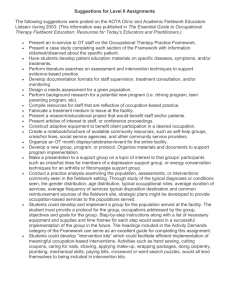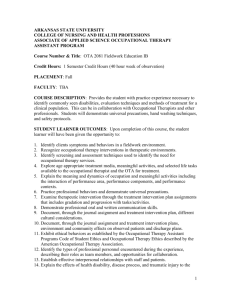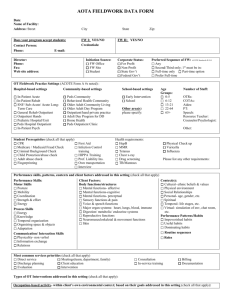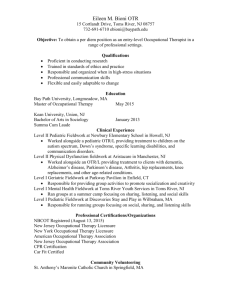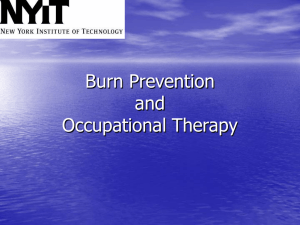Technical Standards - The University of Findlay
advertisement
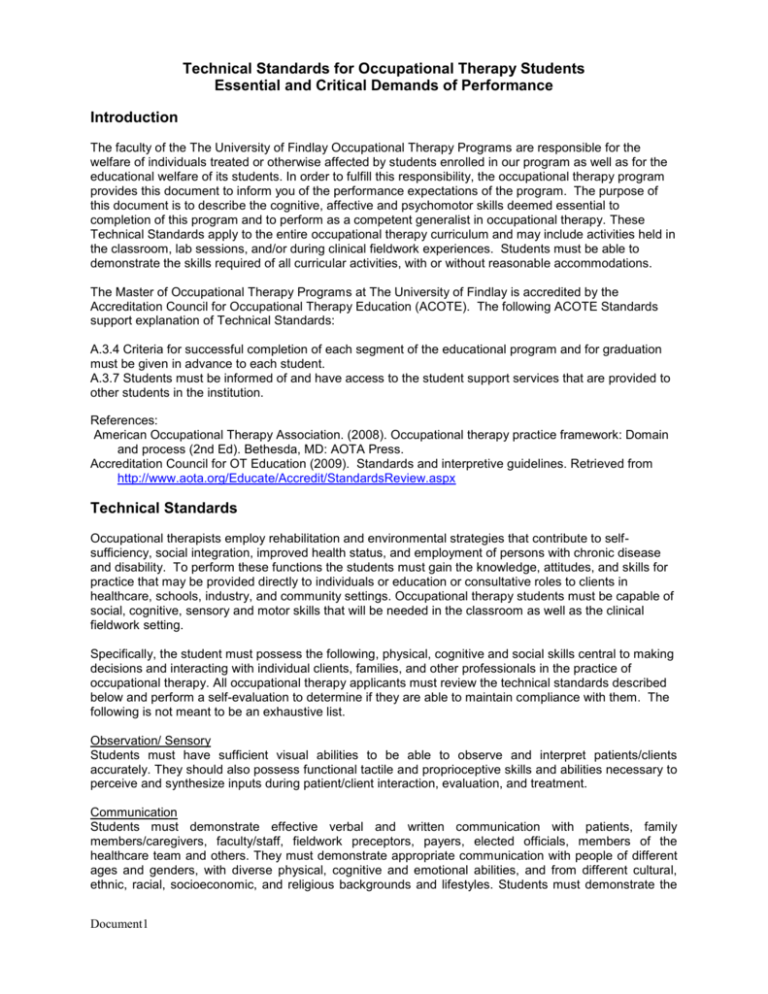
Technical Standards for Occupational Therapy Students Essential and Critical Demands of Performance Introduction The faculty of the The University of Findlay Occupational Therapy Programs are responsible for the welfare of individuals treated or otherwise affected by students enrolled in our program as well as for the educational welfare of its students. In order to fulfill this responsibility, the occupational therapy program provides this document to inform you of the performance expectations of the program. The purpose of this document is to describe the cognitive, affective and psychomotor skills deemed essential to completion of this program and to perform as a competent generalist in occupational therapy. These Technical Standards apply to the entire occupational therapy curriculum and may include activities held in the classroom, lab sessions, and/or during clinical fieldwork experiences. Students must be able to demonstrate the skills required of all curricular activities, with or without reasonable accommodations. The Master of Occupational Therapy Programs at The University of Findlay is accredited by the Accreditation Council for Occupational Therapy Education (ACOTE). The following ACOTE Standards support explanation of Technical Standards: A.3.4 Criteria for successful completion of each segment of the educational program and for graduation must be given in advance to each student. A.3.7 Students must be informed of and have access to the student support services that are provided to other students in the institution. References: American Occupational Therapy Association. (2008). Occupational therapy practice framework: Domain and process (2nd Ed). Bethesda, MD: AOTA Press. Accreditation Council for OT Education (2009). Standards and interpretive guidelines. Retrieved from http://www.aota.org/Educate/Accredit/StandardsReview.aspx Technical Standards Occupational therapists employ rehabilitation and environmental strategies that contribute to selfsufficiency, social integration, improved health status, and employment of persons with chronic disease and disability. To perform these functions the students must gain the knowledge, attitudes, and skills for practice that may be provided directly to individuals or education or consultative roles to clients in healthcare, schools, industry, and community settings. Occupational therapy students must be capable of social, cognitive, sensory and motor skills that will be needed in the classroom as well as the clinical fieldwork setting. Specifically, the student must possess the following, physical, cognitive and social skills central to making decisions and interacting with individual clients, families, and other professionals in the practice of occupational therapy. All occupational therapy applicants must review the technical standards described below and perform a self-evaluation to determine if they are able to maintain compliance with them. The following is not meant to be an exhaustive list. Observation/ Sensory Students must have sufficient visual abilities to be able to observe and interpret patients/clients accurately. They should also possess functional tactile and proprioceptive skills and abilities necessary to perceive and synthesize inputs during patient/client interaction, evaluation, and treatment. Communication Students must demonstrate effective verbal and written communication with patients, family members/caregivers, faculty/staff, fieldwork preceptors, payers, elected officials, members of the healthcare team and others. They must demonstrate appropriate communication with people of different ages and genders, with diverse physical, cognitive and emotional abilities, and from different cultural, ethnic, racial, socioeconomic, and religious backgrounds and lifestyles. Students must demonstrate the Document1 ability to use therapeutic communication and a client centered approach. They must display adequate English language skills in written and oral communication. Motor Students must display adequate motor skills to provide safe, efficient, and effective occupational therapy treatment. Examples of motor skills include sitting and standing tolerance, splint or assisted technology fabrication, computer usage, performing transfers and assisting with ADL/ IADL, providing range of motion and strengthening activities. These motor skills require adequate gross and fine motor function, vestibular function, strength, and functional usage of the sensory system. Intellectual / Conceptual Students must demonstrate problem solving throughout the didactic and experiential components of the program. This includes the ability to interpret information from multiple sources (written, verbal, environmental, interpersonal, etc.), carry out instructions in a timely manner, and understand and follow policies and procedures. Therefore, the student must be able to read complex material, and write in a way that is accurate, descriptive, free from errors and consistent with guidelines or standards. Further, students must be able to apply critical thinking processes in order to gather information, identify problems and alternative plans of action, and make decisions spontaneously, in "on the spot" situations, frequently under pressure from multiple workload, time and variable environmental demands. Behavioral / Social Skills / Professionalism Students must possess sufficient emotional health to fully utilize their intellectual abilities, exercise good judgment, adhere to ethical standards, complete patient care responsibilities promptly, and relate to others with courtesy, compassion, maturity, and respect for their dignity. Because occupational therapy education and practice takes place in a large variety of settings, students must have the ability to participate collaboratively as a (professional) team member, must be able to modify behavior in response to feedback, and display emotional health when faced with changing environments, clinical uncertainties, and stressful workloads that include multiple concurrent demands and short deadlines. This requires the ability of students to be aware of and appropriately react to their own emotional responses. In addition, students must at all times maintain personal appearance and hygiene that is appropriate for professional and classroom settings. All students admitted to the occupational therapy programs should be able to demonstrate these abilities at the time of admission and at all times during classroom, lab and fieldwork. Inability to comply with these technical standards may result in course failure. All occupational therapy applicants must review the technical standards described in this document and perform a self-evaluation to determine if they are able to maintain compliance with them. A signed copy of this form should be returned to the OT Programs’ office signifying the standards have been read and certifying compliance. During Classroom Portion (the following is not intended to be an exhaustive list but is representative of the typical requirements expected) The student is required throughout the academic program to: Lift 10 -50 pounds Rotate & Twist Bend/Stoop Squat Balance Reach above shoulder level Kneel Push/Pull Carry Use hands repetitively Use simple grasping Use firm grasp Use manual dexterity Use finger dexterity Document1 Provide instruction Use auditory/tactile/visual Use senses to evaluate client status Transition from different heights (chair - floor - plinth) Attend class approximately 35+ hours per week which includes the following: Lecture Laboratory Task group meetings Integrated clinical experience Reading, studying and absorbing classroom materials Meets class standards for course completion Participates in classroom discussions Performs and/or instructs others in a timely manner in the following: Transfers - performs and/or instructs Activities of daily living (dependent through independent status) - performs and instructs Splinting - performs Therapeutic activities/procedures Task and verbal group activities Carries out assessment procedures using sound judgment and safety precautions Applies critical thinking process to requirements of the academic learning experience in Lecture Laboratory Integrated clinical experience Addresses problems or questions to the appropriate person at the appropriate time Maintains personal appearance and hygiene conducive to professional student setting Travels or relocates to various locations required for internships and practicums Maintains work area, equipment and supplies in a manner conducive to efficiency and safety Models socially appropriate behaviors Manages time effectively Communicates with peers, faculty and staff effectively and professionally Treats peers, faculty, staff, patient/clients with respect Conducts himself/herself in an honest manner in dealing with faculty, staff, guest speakers and peers Assumes responsibility for professional conduct and growth Is responsible for abiding by the rules and regulations of the Occupational Therapy Programs, fieldwork facility and profession (AOTA) In an average academic day a student must: Sit Stand Walk/travel 2-6 hours 2-4 hours 2 hours During the Clinical Fieldwork Experience portion: Adhere to the technical standards of the site - Fieldwork sites may have additional technical standards beyond those pertaining to the occupational therapy curriculum. (Accommodations given during Fieldwork rotations are determined by the Fieldwork site) Travel to clinical fieldwork site Manage time effectively Move within clinic/community setting on a variety of surfaces (steps, uneven ground) Comply with deadlines Follow appropriate chain of command Follow all policies and procedures required by fieldwork sites in addition to program policies and procedures Complete all assignments from both FW site and Academic FW coordinator Maintain patient/client confidentiality Comply with dress code Document1 Meet attendance requirements Demonstrate professional standards of practice and adheres to AOTA code of ethics Maintain work area, equipment and supplies in a manner conducive to efficiency and safety Model socially appropriate behaviors Create an environment which maximizes client responses Document all required information Effectively adjust communication for intended audience Demonstrate problem solving skills in patient care Gather information needed prior to assessment Select relevant areas to assess Select the correct methods for assessment Administer assessment procedures accurately Adapts assessment method as needed Interpret assessment data accurately Interpret assessment/reassessment results accurately and completely Establish relevant goals/outcomes and treatment plan with patient/client Carry out treatment plan as appropriate Engage appropriately in a supervisory process Use sound judgment in maintaining professionalism when communicating with peers and patients or their caregivers Respect diversity and the values of others CPR Request for Accommodations If a student cannot demonstrate the Technical Standards described previously, it is the responsibility of the student to request an appropriate accommodation. The University will provide reasonable accommodation as long as it does not fundamentally alter the nature of the program offered and does not impose an undue hardship such as those that cause a significant expense, difficulty or are unduly disruptive to the educational process. A reasonable accommodation is intended to reduce the effects that a disability may have on a student’s performance. Accommodations do not lower course standards or alter degree requirements, but give students an equal opportunity to demonstrate their abilities. Students with sensory and or motor limitations may be able to perform as an occupational therapy student if they possess the ability to direct an assistant to perform the activity or use assistive technology. If they are directing another, they must be able to monitor the person’s performance, perceive objects in the environment and observe performance. For example a student with physical limitation may be able to instruct another person (an assistant or aide who has been trained) to perform tasks that they cannot do because of weakness or lack of movement. It is also possible to use compensatory aids and assistive technology such as hearing aides or sign-language interpreters, adaptive equipment or computers. A student will be given the opportunity to demonstrate competence while using these accommodations, (personal or equipment). A student seeking accommodations may do so at anytime. Complete information regarding the process of obtaining accommodations during the academic portion of the program, as well as additional documentation that may be required, can be obtained from the: Office of Disability Services 419.434.5532 Lori Colchagoff, Director lcolchagoff@findlay.edu Main 07 Document1 Add signature page Document1
